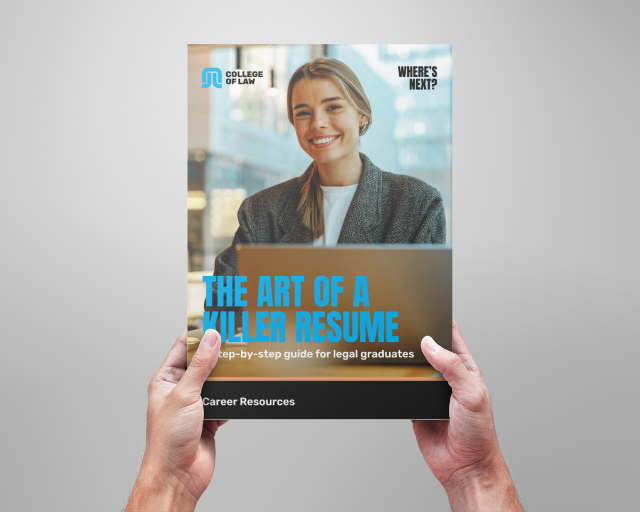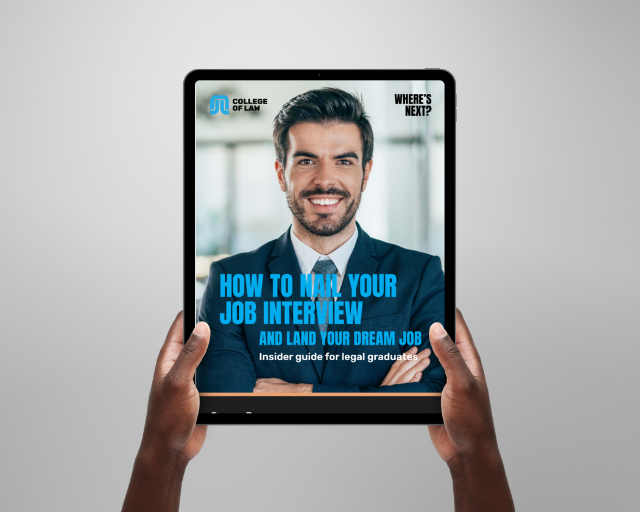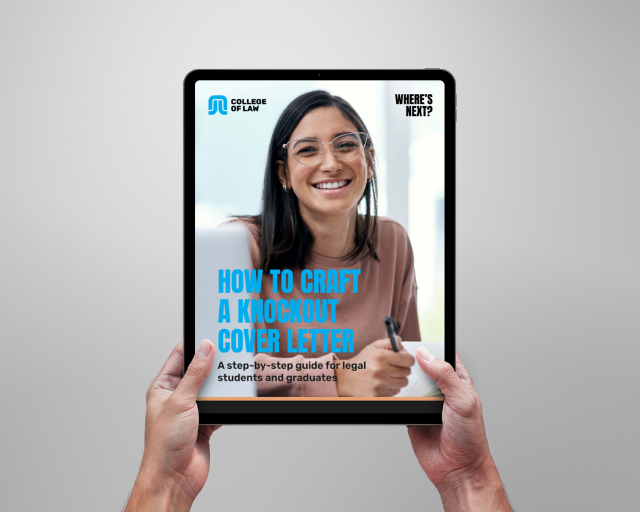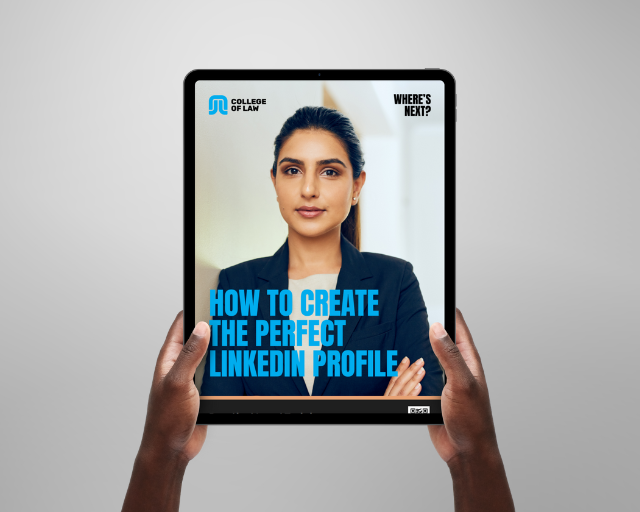Estimates range anywhere from 60% to 80% of jobs are not advertised. If so, how do you unlock the hidden job market? Is it all down to who you know? Or are there other ways to land your dream job?
We caught up with the College of Law’s National Careers Advisor Ruth Beran for her top tips to access the hidden job market, how you conduct an informational interview, and unorthodox approaches she’s seen succeed.
Embrace a proactive, not reactive, approach to your job search
Unearthing the hidden job market requires a shift in mindset.
“You need to shift from simply applying for roles when they are advertised on platforms like SEEK and LinkedIn,” Ruth explains. “It is a proactive rather than reactive job search. The first step in accessing the hidden job market is to actively ask yourself – where do I want to work?”
Rather than waiting passively for your dream job to be advertised, this question requires you to explore your career choices.
“It helps you determine factors like your values, areas of law you want to practice, size of employer, employer location, whether you want to work from home or remotely, and then doing some research to find some ideal employers who are an ideal match,” Ruth says.
A good job search strategy will see you applying for both advertised and hidden roles, though with advertised roles, you will be competing with everyone else who applies.
“Hidden jobs can sometimes be created just for you or you might get in just before the employer advertises a new role so you can get a head start on the process.”
Ruth’s top 5 tips to access the hidden job market:
- Foster your network – reach out to friends, family, lecturers, acquaintances – anyone you know who can help you in your search for a job or to get an understanding of a certain area of law. Join your local Young Lawyers – some have subcommittees for certain areas of law – and attend conferences, functions and events, both online and in person.
- Master LinkedIn – while the saying, “it’s not what you know, it’s who you know”, may well be true, you can create your own network on LinkedIn. According to Harvard Business Review, it is moderately weak connections — and not strong connections — that are the most useful in finding a new job.
- Conduct informational interviews with individuals in roles that you aspire to. While the idea here is to gather information, rather than ask for a job, you may end up being offered one.
- Use your local register of solicitors to research firms you want to work for and reach out to the firm/solicitor via an introductory email or LinkedIn message before a job is advertised. You can refine your search by location, specialisation, and sometimes even by language. Your local law society should provide a register of solicitors, or LawConnect provides a national directory.
- Find a mentor – this may be through a formal program or informally. Mentors can provide guidance in so many aspects of your career but may also be able to suggest or even introduce you to potential employers.
Advice for ‘informational’ interviews
This is an indirect approach designed to explore career paths or potential employers. Simply put, an informational interview involves asking someone a set of questions to get ‘information’ about their careers or employers.
“Treat it as a self-directed research project that can help you work out the next step in your professional journey,” Ruth says.
“Instead of asking for a job, focus on asking for information about them and their career. If it seems that you’re just looking for a job, they will probably direct you to HR or the careers tab on their website. Also, if they don’t have a job on offer it is likely that the conversation will be shut down.”
Embracing an informational interview approach is a very different method.
“An informational interview may lead to a job in the future, it is not the focus. Instead, the focus is on them. It is also a subtle way of building your network. Start by asking for their help as people will often respond to a direct request for assistance,” Ruth shares.
For example, “I’m wondering if you could help me understand your career path” or “I’d love your help to get a better picture of this area of law…”
“Do some research on the person and their career before conducting the interview and ask some targeted questions,” Ruth says. “Make sure to ask questions that you can’t answer yourself by simply looking at their LinkedIn profile or online.”
What should I ask during an informational interview?
- What path did you follow to get to where you are? Did you have some interesting pivots along the way?
- What do you like about your role? What keeps you up at night?
- What does a typical workday look like for you?
- What is your employer like to work for? How did you get a job there?
- Did extra study help you get to where you are?
- What are the career prospects like in your area of law, or for your employer?
- Would you recommend that I pursue a career in the area of law you specialise in?
- What advice would you give to me as someone starting out in my legal career?
“If you are not comfortable asking people for information, you could frame your request in terms of asking for a ‘reality check’,” Ruth suggests. “A question like - ‘Can I test my thinking on you and seek your advice on starting a career in a certain area of law, such as family law, or in a particular organisation?’”
An alternative approach is to share a “working theory” and ask the person to test your thinking.
“This can be easier than directly asking for information,” Ruth says.
While you can email a request for informational interviews, LinkedIn is one of the best ways to use this approach.
“Check your network and reach out to warm contacts first, then expand if needed,” Ruth advises. “For cold contacts, try connecting on LinkedIn first, adding a note to let the person know what impresses you about them or their organisation. If they connect, then send a targeted and well-researched message. Be clear about why you are asking to meet and consider including a time limit, such as 20 minutes, for the conversation.”
How can you make the most of LinkedIn?
A major misconception Ruth encounters is that LinkedIn is only for working professionals.
“LinkedIn is for students too,” Ruth says. “If you are new to LinkedIn, start small. You can keep adding and changing your profile, it doesn’t need to be perfect right from the start.”
To get started, check out two live and on-demand courses run by LinkedIn for students, Rock Your Profile and Tap Into the Power of LinkedIn.
“Reach out to people and connect – the sooner you start, the bigger your network will grow,” Ruth says. “When connecting with people on LinkedIn, make sure to add a note. The option of adding a note is only available from the web version of LinkedIn and is limited to 300 characters. In your message, explain who you are, that you are interested in that person’s area of law and/or career and that you’d like to add that person to your network.”
For example: Hi Matthew, I am a graduate lawyer with a demonstrated interest in criminal law. I see that you have been working in this area for 8 years and I would love to connect. Kind regards, Sam.
“To get the most out of LinkedIn, start conversations, discuss industry news, share posts and react to other people’s posts,” Ruth says. “Like any social media platform, the more you use and interact with people on LinkedIn, the more visible you are and the more likely you are to see opportunities people post before being officially advertised or be approached about roles.”
How to approach cold contacts for jobs
Researching the person and organisation you are contacting is essential. This will help you demonstrate why you are a good fit for them.
“Tailor your request and use the person’s name when expressing your interest,” Ruth emphasises. “If you reach out on LinkedIn, make sure your profile is up to date and makes a good impression. Alternatively, if you send an email, attach your resume.”
A well-developed elevator pitch which demonstrates your value proposition is essential.
“Ask yourself: Why would the person you are contacting want to employ you? Then demonstrate why you are a good match for their organisation,” Ruth says.
“If you would rather pick up the phone, have your elevator pitch ready, write a script or have your CV in front of you – whichever works best for you. Phone calls aren’t so common these days, so you will be remembered! You can ask if the organisation has any roles available at the moment. If you don’t have a direct number, getting past the gatekeepers can be the hardest part. Always have the name of the person you want to speak to. Sometimes you will get lucky and be put straight through.”
Instagram, spreadsheets and other unorthodox approaches
According to Ruth, one lawyer she knows landed her first graduate role on Instagram.
“She used social media to put out who she was and what she believed in,” Ruth explains. “She was targeting her ideal employer and in particular, the lawyer in that firm who she really wanted to work for. She also made herself visible by going to networking functions and took on any opportunities that would make her an attractive candidate for her ideal role. When she finally posted on Instagram that she had finished her university studies, her phone rang the next morning and the lawyer she’d been 'stalking' for the past two years offered her a job.”
When another lawyer moved to New York, she created a spreadsheet of 80 people to request a conversation.
“Of the 80 people she emailed, 5 said they would speak with her,” Ruth says. “She was offered a job using this technique. Sometimes accessing the hidden job market is a numbers game.”
“One law student was working in contract novation for seven years while studying to become a lawyer,” Ruth says. “After applying for numerous legal roles, she realised that her previous experience in contracts was something she could capitalise on, so she targeted in-house roles that would value her skills and then cold-contacted them. It took a number of months, but she was offered a role in a large consulting firm, initially in their contracts team and then six months later, once a role became available, in their in-house legal team. It was obvious from speaking to her that this role was not only an excellent fit for her but that her new colleagues were really excited to have her on board.”
Ruth has personally found cold contacting to be a successful route to accessing the hidden job market.
“I know how important it is to use both the advertised and hidden job markets when progressing your career,” Ruth shares. “It is also worth noting that accessing the hidden job market is not necessarily quick, although sometimes it can be. It’s about cultivating meaningful connections, leaving a positive impression and then being remembered when a job does become available.”


























































![How to handle Direct Speech after Gan v Xie [2023] NSWCA 163](https://images4.cmp.optimizely.com/assets/Lawyer+Up+direct+speech+in+drafting+NSW+legislation+OCT232.jpg/Zz1hNDU4YzQyMjQzNzkxMWVmYjFlNGY2ODk3ZWMxNzE0Mw==)






























